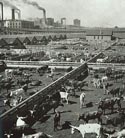Timely Article Series
I've had the thought before that if I was really to examine my beliefs and act on them I'd be a vegetarian, I just find myself a bit too lazy and lacking in conviction. I'm afraid my interest in this issue may end up being the same, but I'm intrigued by the movement to only eat locally produced food. In today's Kansas City Star is the first article in a four-part series about that movement. Wednesday is supposed to be "Community Supported Agriculture," Oct. 4 restaurants, and Oct. 11 supermarkets. I'll try to link them as they come out.
I think this movement addresses a lot of the evils we're reading about in The Jungle. There may be better regulations in place today to prevent the sale of rotten meat and the dangerous working conditions, but there are still problems with the industry since it's all about producing as much food as cheaply, quickly, and efficiently as possible. Growth hormones, pesticides, preservatives, and plenty of other chemical treatments go into the food we eat. Eating organic addresses this aspect of the business, but not the mass production aspect. Even organically produced food can depend upon cheap labor, unpleasant working conditions, and environmental practices that might be questionable. Eating locally eliminates the big factory settings like those in the book, the faceless anonymity of corporate capitalism. You know where your food is coming from and who is producing it, and those producers are directly accountable to their customers. Things are grown and eaten as they are naturally in season in a much more environmentally friendly way. It's not just about changing the way you eat, but changing the way the entire food industry functions.
The article goes into much more detail, so if you are curious I'd recommend giving it a read.
If you want to see just what it would be like to eat locally, the companion article, The 100-Mile Diet: What if KC tried Canada couple’s approach? gives an interesting consideration. In our area the only way to get fruits and vegetables in winter with this approach is to can, dry, freeze, or preserve them, for instance. Sometimes doing the right thing can require sacrifice.
And if we want a companion read for after we've finished The Jungle, maybe we should take a look at this (from the bottom of the first link):
I think this movement addresses a lot of the evils we're reading about in The Jungle. There may be better regulations in place today to prevent the sale of rotten meat and the dangerous working conditions, but there are still problems with the industry since it's all about producing as much food as cheaply, quickly, and efficiently as possible. Growth hormones, pesticides, preservatives, and plenty of other chemical treatments go into the food we eat. Eating organic addresses this aspect of the business, but not the mass production aspect. Even organically produced food can depend upon cheap labor, unpleasant working conditions, and environmental practices that might be questionable. Eating locally eliminates the big factory settings like those in the book, the faceless anonymity of corporate capitalism. You know where your food is coming from and who is producing it, and those producers are directly accountable to their customers. Things are grown and eaten as they are naturally in season in a much more environmentally friendly way. It's not just about changing the way you eat, but changing the way the entire food industry functions.
The article goes into much more detail, so if you are curious I'd recommend giving it a read.
If you want to see just what it would be like to eat locally, the companion article, The 100-Mile Diet: What if KC tried Canada couple’s approach? gives an interesting consideration. In our area the only way to get fruits and vegetables in winter with this approach is to can, dry, freeze, or preserve them, for instance. Sometimes doing the right thing can require sacrifice.
And if we want a companion read for after we've finished The Jungle, maybe we should take a look at this (from the bottom of the first link):
If there’s a must-read book that defines the array of issues involved in local eating, it’s The Omnivore’s Dilemma: A Natural History of Four Meals ($26.95, Penguin Press).
How influential is the best seller? Nearly everyone who was interviewed for this story was reading it.
The book’s author, Michael Pollan, criticizes Whole Foods for promoting what he calls “big organic,” or the industrialization of organic food. Since the book’s release in April, Pollan and John Mackey, CEO of Whole Foods, have been engaging in a spirited blogfest at www.wholefoods.com and www.michael pollan.com.
By summer, Whole Foods had announced its “Go Local” campaign, a companywide initiative that includes farmers markets in store parking lots, $100 gift certificates for consumers who share local sources with stores and $10 million to make loans to small-scale farmers.
Eager to apply the initiative, Rebecca Miller, marketing director for Whole Foods in Overland Park, was among the first to recommend picking up a copy of the book.
“We’re a very fine store, and we’re a very fine company worldwide,” she said, “but you go into our stores and we don’t have a lot of local food.”


1 Comments:
I'd love to be able to eat locally. I was listening to NPR and they were talking about how New York City is trying to ban saturated fats in resturants. I think that if we cooked our own meals, or paid attention to where the food came from, developed those relationships in a community instead of worldwide conglomorates, we'd be in better shape.
Post a Comment
<< Home